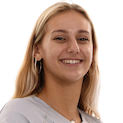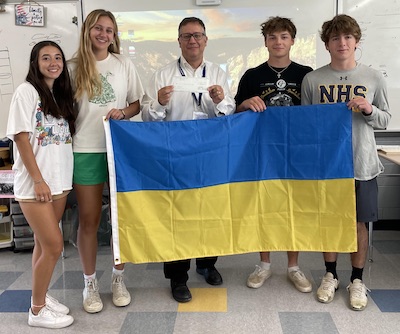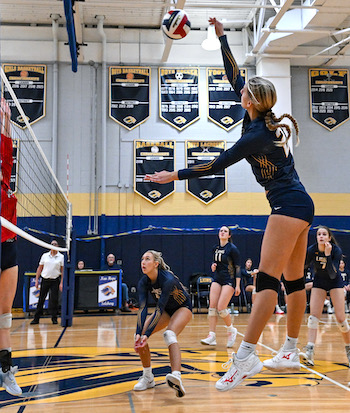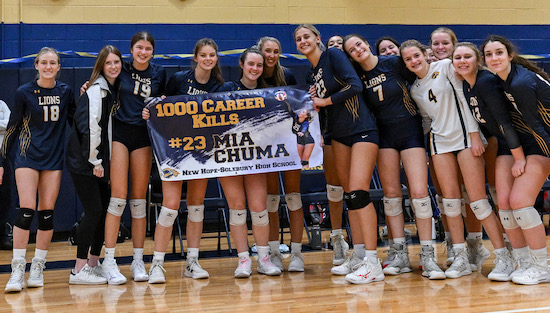
Volleyball
Favorite athlete: Michael Jordan
Favorite team: Alex Klineman and April Ross - USA Beach Volleyball Team
Favorite memory competing in sports: Playing against Abington at home this past season. My school team played the best it has, I think, in its entire career. We played in such a strong state of connected flow that I hope to achieve with my other teams in the future. Also, our student section had such great energy!
Most embarrassing/funniest thing that has happened while competing in sports: When I ran my first mile at a local fun run event, I didn’t realize how far a mile was so I started sprinting immediately, naturally thinking I would finish in first place. About halfway through, I started getting such horrible muscle cramps. Then I vomited and walked the rest of the mile with the moms in the back. I was six.
Music on playlist: A lot of 70s folk music, Kid Cudi, Bad Bunny, Mac Demarco, Milky Chance, and The Growlers.
Future plans: Play volleyball in college, become a marketing director of a luxury brand, continue to advocate and assist in the rebuilding of Ukraine.
Favorite motto or words to live by: Adversity equals growth and become the hardest working person you know.
One goal before you turn 30: Maintain a vegan diet for at least six months.
One thing people don’t know about you: My age matched my shoe size from ages 6 to 12.
By Mary Jane Souder
Mia Chuma was born to play volleyball.
Measuring in at 6-1, the New Hope-Solebury senior is the ultimate finisher at the net and recently surpassed the seldom-reached 1,000-kill mark. She has turned her considerable talents into an opportunity to compete at the Division 1 level and has made a verbal commitment to Georgetown University.
“One of the really cool things about Mia is she is a kid that thinks of herself last honestly,” New Hope-Solebury volleyball coach Chris Marchok said. “I have three senior leaders on this team, and they are servant leaders in the truest sense of the word, and Mia, for all of her talents, for all of her accomplishments, she is first and foremost focused on her teammates, she’s focused on the team.
“I get officials thanking me after the game, saying it was such a pleasure to watch – who was #23. They look at the hardest hitting kid out there, and they see her when other kids fail, when other kids stumble – she’s the first one patting the kid on the back, cheering her up. For me, the really, really neat thing is to see a kid who’s so focused on others have that kind of individual success.”
Volleyball, it turns out, is just one small piece of Chuma’s busy life.
Her resume off the court is a dazzling one. She has been a member of student council since freshman year and this year serves as president of the entire student body. Chuma also excels in the classroom and is a member of the National Honor Society, just one of a long list of organizations vying for her time.
While that’s the student-athlete most see and know, those who know her best know that there’s another Mia Chuma, the Mia Chuma who doesn’t just say she’s a Ukrainian-American but passionately lives it.
So, on Feb. 24, 2022, when Russia launched a full-scale assault on Ukraine, it was personal for many reasons. Not the least of which was the fact that Chuma – whose grandparents on both sides were part of the first wave of Ukrainians who immigrated to the United States between 1945 and 1950 - had a cousin and uncle fighting in the war.
“The women and children have thankfully escaped safely so that’s good, but I do have family still there and a lot of friends as well,” Chuma said. “It’s heart wrenching. At the start of the war last February, it was really hard just going to school.
“There are always wars and crazy things going on in the world, but once it’s your people, it’s totally different, which made me rethink everything. It was really weird going to school every day – how my friends went through the day like everything was normal. Meanwhile, my social media fee was flooded with images and news and also propaganda, so there was just a lot.
“Many tears were shed, but now the tears have dried. We’re doing a lot more activities and really trying to help people. Now it’s time for action. We’re tired of being mournful.”
Chuma organized a Ukrainian Humanitarian Collection Drive within her community.
“I also made a video montage for one of my father’s events where he was MCing for a fundraiser,” she said. “There was a Shady Brook Farm event, and he’s also in one near Montauk in the Hamptons which was another event where they used my video as well, kind of raising awareness. Also, within (Ukrainian) Scouts we have a lot of fundraising, online and just spreading news that way.
“Over the summer, I was a Ukrainian Camp counselor because I’m in Ukrainian Scouts, and so we actually had a couple of refugee kiddoes under the age of 11 with us, so we got to bond with them.”
For those unfamiliar with Ukrainian Camp and Ukrainian Scouts, you’re not alone. All are a unique but important part of Chuma’s life and heritage, a part that defines who she has become. Which is much more than just a star volleyball player and student leader.
A proud Ukrainian heritage
For those who think five days of school is more than enough, Chuma’s schedule – which included attending Ukrainian Heritage School in Jenkintown every Saturday from 9 a.m. to 1 p.m. – would be daunting at the very least. Ukrainian school begins in pre-k and continues through 12th grade.
“It’s like your regular school, but they taught us history, literature, culture and geography of Ukraine, also written language and how to speak fluently,” said Chuma, who completed Ukrainian school a year early. “A lot of our teachers are from Ukraine. Especially when the war happened – it was very difficult getting through class when these teachers literally had in their earbuds the news going on because so much of their family is still there.
“Sometimes going to school on a Saturday isn’t really the best thing, so a lot of the kids were very much not into the whole Ukrainian school, but now I think it’s a lot more engaging just because they’re like – this is important, we’re seeing this happen. My history teacher emphasized that you need to know the right history because the winners write history and for so long it’s this Russian-biased history.”
Ukrainian Scouts is another important part of Chuma’s packed life.
“Basically, the origin is when the wave of our grandparents and that first generation leaving Ukraine – they were put in displaced persons camps in Germany and Austria and places like that,” Chuma explained. “Within those camps, they created communities and organizations, and the Ukrainian Scouts was one of the organizations created.
“The basics of it is that it was mostly an army camp in that they were prepared to go back and experience or fight in war, so a lot of our training is similar to an army or military camp in the sense that we do marching, and we learn how to fend for ourselves in the woods and find fresh water, make a torniquet, a lot of that kind of basics.
“But also, there’s a really good cultural and social aspect, bonding. I’ve been going to scouts camp since I was six. It’s a three-week sleepaway camp in either New York or Ohio, and it’s like the whole other world of my life here, so I have my American friends and I have my Ukrainian Scouts friends which are like my whole family, so it’s just a really great community to be a part of.”
Destined to be a difference maker
Chuma choosing to play volleyball also had its roots in her Ukrainian community.
“You do either soccer or volleyball,” she said. “Athletics was always important. My grandpa was a high jumper, my siblings did track. It was always – athletics has to be part of my life in some way. I thought I was going to be a soccer person first and then basketball because I was so tall early on. I tried soccer when I was in third grade, but that only lasted about a month.”
Basketball might have seemed like a natural choice since Chuma was both tall and athletic.
“I played my first year of middle school and recreationally in elementary school, but again, just kind of a different mindset,” she said. “These girls were already starting club early on, and they would spend their weekends playing basketball, but I just didn’t have that chance since I had Ukrainian school on Saturdays and other events.
“My uncle played (volleyball) at the collegiate level, and any time we had down time, my family would pass the ball around, just start to play volleyball, but I never officially began playing on an actual team until seventh grade, which was in school.”
In eighth grade, Chuma was sidelined with an injury and unable to play, but by that time, she had developed a love of the sport and joined a club team when she was in ninth grade.
“It wasn’t a possibility at first because I had Ukrainian school on Saturdays, so I didn’t think I could juggle it,” she said. “But I just had to try it freshman year. The rest is history, I guess.”
And what a remarkable history it has been, although she acknowledges she was a true novice when she joined her high school team in ninth grade.
“Again, having not really been in volleyball officially – I was on varsity freshman year kind of hitting around but not really sure of the form or anything like that, so at (club) tryouts, I initially tried out to get on the15’s team,” Chuma said. “After the tryouts, the coach asked me to stay for an extra hour to try out for the 16’s team, which was playing up a year, so I was immediately intimidated, but I thought I’d give it a shot. I was there for that extra hour and got an offer to play on the 16’s team, playing an age level up.”
So began a pattern of commuting two hours a week to practice with the Princeton Volleyball Club, doing homework on the way home from a 9-10 pm practice. This year Chuma is playing for Princeton Volleyball Club’s 18-1 National team.
Georgetown University entered the picture this past summer.
“That was a goal of mine for the longest time,” Chuma said of playing collegiate volleyball. “But actually, freshman year, I told myself, ‘Oh, you can’t keep up with club.’”
As a matter of fact, Chuma still has a message on her phone Notes app that she wrote to herself that year: “Quit club next year.”
“I never thought playing at the collegiate level was a possibility,” Chuma said. “Then I had such great coaches at my club. Nancy Yasalonis and her son kind of ran our team, and they were just so informative and told me it was an opportunity to play at the collegiate level.”
As for her 1,000-kill milestone, Chuma is the first volleyball player in program history to earn that distinction.
“I always thought it would be nice to have that,” she said. “I saw seniors who would get a thousand digs or a thousand assists, but I never saw a thousand kills at our school. I knew it could possibly happen.
“I was so grateful for the team to get me there. Seriously, to get that goal of a thousand kills – it’s such a team sport. You need to have a great pass and a great set - Grace Hanley was our setter  freshman and sophomore year and Anna Leasure the last two years. The setter and the passers are super important. Otherwise, I would not have achieved this goal.”
freshman and sophomore year and Anna Leasure the last two years. The setter and the passers are super important. Otherwise, I would not have achieved this goal.”
Chuma reached the elusive milestone in the Lions’ non-league win over neighboring Central Bucks East. She finished the match with 18 kills and a dazzling .460 kill percentage.
“That was quite a night for her, and doing it with East out there,” Marchok said. “We have a ton of respect for the program. It was a fun night.”
The Lions’ coach had an idea that Chuma – although initially rough around the edges – would develop into an impact player.
“As a freshman, she was getting significant playing time, so we knew right away there was something special,” Marchok said. “We knew she had something very special in her, and she has never disappointed in her attitude and her effort. There’s nothing taken for granted by Mia. She put in her time with club teams, she put in her time with trainers, always trying to get better.”
In addition to an ambitious volleyball and academic schedule, Chuma somehow finds time to be involved in Key Club and NHS Cares, the antidrug and alcohol club for the community. She is a member of the Student Equity Committee, and she also started a Fashion Club at school her sophomore year.
“In that, we also made flags and ribbons for Ukraine to show support using our sewing and designing skills for that but also regular spirit wear and raising money,” Chuma said.
When it came to choosing a college, Chuma considered numerous schools, but Georgetown felt like the right fit.
“One of the tipping points was over the summer I was committed to being a camp counselor for my Ukrainian Scouts Camp where we had refugees coming in, and it was really important to be a part of that,” Chuma said.
Around that same time, colleges were holding their volleyball camps, which are vital for athletes interested in playing at the next level. Chuma informed the coaches she was in communication with that she would be unable to attend due to her commitment to serve as a counselor.
“Some coaches responded with nothing, but the Georgetown coach responded, ‘We love that you’re doing that. It’s good to be a well-rounded individual,’ so that was really important that they appreciated I had a life outside of volleyball,” Chuma said. “Also, meeting with the team and just what Georgetown stands for as a program as a whole and the athletic department just being so supportive of students and their careers, and their community service made it even more of a great fit.”
Chuma – who is still going through the application process and awaits acceptance - plans to major in marketing in Georgetown’s business school with her sights set on one day becoming marketing director of a luxury brand
“I definitely think in some way policy will also be part of my future, tying in what I’m passionate about which is fashion, visuals and aesthetics with the business and analytical side,” she said. “Seeing demographics and using platforms for good since so many industries and brands have very much influence on social media. I like threading the two of them together as part of my future.”
Chuma also hopes to use the marketing expertise she acquires in the rebuilding of Ukraine, making it a mecca of Eastern European culture.
“The war is terrible and tearing so many things down, but that always means that we have a fresh start coming up soon which is super exciting,” she said. “I think President (Volodymyr) Zelensky sees that as well. He’s already thinking about the infrastructure and stuff, so assisting in that sense with marketing and anti-Russian propaganda within the marketing business- I’m interested in that field.”


